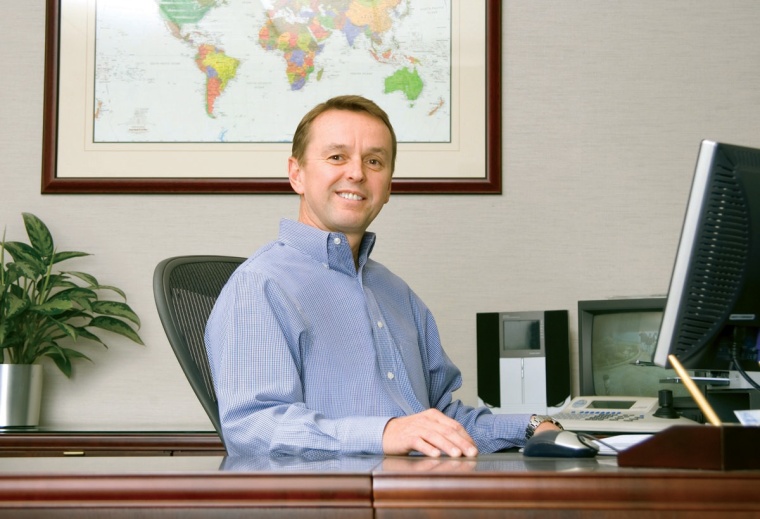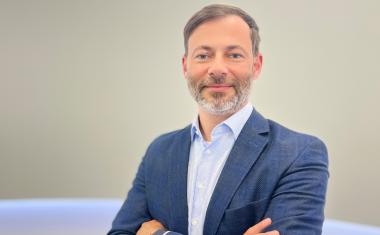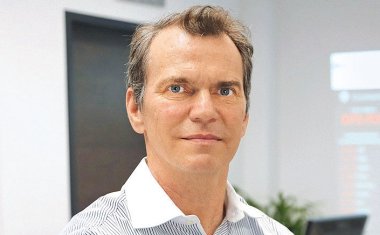Pelco: Interview with Pelco’s new president and CEO Dean Meyer
Pelco: Interview with Pelco's new president and CEO Dean Meyer. In January Pelco announced that Dean Meyer has been promoted to the position of Pelco’s President and CEO, where he ...


Pelco: Interview with Pelco's new president and CEO Dean Meyer. In January Pelco announced that Dean Meyer has been promoted to the position of Pelco’s President and CEO, where he is replacing David McDonald, who has served as such for the past 20 years. Dean Meyer is now responsible not only for continuing the transition and organisational refocus as a result of the recent Schneider Electric merger, but also for ensuring that the true business and value-creation opportunities are realised. He began his professional career with Texas Instruments. In 1993, he joined Control Systems International, which would eventually be acquired by TAC and Schneider Electric. For the last seven years, he was president of TAC Americas. Having grown the company five fold into a half-billion dollar enterprise, he now brings his experience with the Schneider family to Pelco, where he most recently he has served as COO since November 2007.
What were the forces behind Schneider Electric’s acquisition of Pelco?
D Meyer: Schneider wanted to expand its footprint and portfolio in the Building Automation business, which is overseen by TAC. Building automation is primarily made up of HVAC, Security, and Fire. Prior to the Pelco acquisition, its expertise was mostly in HVAC, with security and fire comprising only a small percentage of overall TAC revenue. Pelco is the number-one provider of video security, i.e., a natural strategic fit.
Can you briefly explain how Pelco fits into the overall Schneider Electric organisation and the role Pelco will play?
D Meyer: Pelco is an autonomous entity within the Building Automation Division (TAC) of SE. As its president and CEO I will report directly to Arne Frank, chairman and CEO of TAC worldwide. In this capacity, Pelco will lead SE/TAC’s efforts in Fire and Security worldwide. We will have a global focus on selling integrated security solutions inclusive of video, access control, and fire.
What did you know about your new company before being asked to take over the role of CEO?
D Meyer: I knew it as “the big camera company”. Of course, since the acquisition went final, I have learned a lot more. Couple that with being part of the sales integration team during which time I worked with Scott Schafer, senior vice president North American Sales & Marketing, and Jim Brannan, senior vice president International Sales, and I am beginning to understand what Pelco is really all about.
What were your thoughts about being offered the position?
D Meyer: I immediately jumped at the opportunity to become part of Pelco. Personally, I enjoy change and challenges, and from what I had heard about Pelco, I knew that I would be very aligned with its unique culture, which was important. That was probably half of my motivation. In fact, it was a situation that seemed a little bit too good to be true.
Additionally, I am excited about the challenge of bringing some experience to this unique opportunity and doing it at a high level.
As of this interview, the acquisition has been official for fewer than two weeks. What are your primary concerns and considerations?
D Meyer: Everything. The biggest challenge we have that keeps me up at night is the merger with Integral. Let’s be realistic, we are not merging with Schneider Electric; we are merging with Integral. And the key is to do it fast and get through it quickly. So that is one of my highest priorities.
There are a multitude of items related to this such as all of the ERP [enterprise resource planning] systems, organisational set ups, customer order points, tech support combinations, etc.
And once that is taken care of?
D Meyer: Once the nuts and bolts of merging the Pelco and Integral companies is complete, the big task ahead will be in realising the value creation – the reason why we are here. We accomplish this, in part, by leveraging the Integral technologies now available to us, and by leveraging the customer service model that Pelco brings and applying it to the Integral customer base.
We also help deliver on the business case for the acquisition by leveraging TAC and Schneider to help grow Pelco internationally.
What does the merger with Integral as part of the Schneider Electric acquisition mean to existing Pelco customers, in particular, and the industry in general?
D Meyer: To existing Pelco customers it means that they will have access to additional products, in particular, the Integral DS line. Additionally, they will eventually be able to add electronic access control. To the industry in general, it broadens Pelco’s offering and accelerates its entering into the electronic access control (EAC) and fire market-places.
So undoubtedly there is tremendous growth potential.
D Meyer: Of course. There was already Pelco’s own growth platform with the migration from analogue to digital technologies. Now we have the EAC platform that we are bringing in worldwide. And eventually we will be adding fire systems integration opportunities with the addition of ESMI to our product and services portfolio. All combined, we can offer quite a broad and comprehensive system solution and we can do that with a channel that is quite proficient.
Discuss the changes to be expected as Pelco moves from a privately held company to a part of a larger, multinational, public company.
D Meyer: I think it’s important to note that obviously we are part of a big corporate company and as such we have ways that we are expected to act. But I think it is equally important to protect those things that have made Pelco so successful in its own right, namely the customer service model, the community outreach, the employee empowerment.
So I am very sensitised to the blend of shareholder accountability and the entrepreneurial core values that Pelco has. As well, there are certain requirements that come with being part of this greater corporate entity. But one of the things that excites me is the ability to exploit the necessary budget process which will be required and push down more decision making and accountability to managers.
Can you describe the relationship that Pelco will now have with TAC ?
D Meyer: It’s really important to note that Pelco will treat TAC as a national account, just like we treat Siemens, ADT and all the others. In terms of our arrangement with TAC, we are another supplier to them and their pricing will be consistent to the pricing given to any other national account. The channels are sacrosanct so it is not in our interests to treat TAC any differently than the other integrators with whom we have forged important relationships.
Will Pelco Reps and dealers sell TAC and Schneider products?
D Meyer: They will certainly be able to sell those products that make sense, those lines that complement their current portfolios. A Pelco Rep is not going to start selling HVAC controls, but power supplies, APC racks – these are the main items that come out of Schneider that make sense to push through the same channels.
And access control as well. That is certainly the biggest one.
Discuss the opportunities now available with electronic access control and video.
D Meyer: Access control and video together are really like two peas in a pod. And now we are merging the best of the best with Pelco and Integral’s EAC’s ventures. Add to that the fact that we own a Fire Systems company, Finland-based ESMI. When we look at the integrators, at least 50% already carry someone else’s access control line and a fire line because Pelco doesn’t have an offering today.
And we think they are going to be more than happy to move some of that toward us if they can expect to receive the same customer service that they have received on the video and imaging side. So there is a lot of upside if we can integrate and accelerate those product offerings into our portfolio and deliver the same customer service approach that we are known for.
A few industry polls reflect a concern that the acquisition will negatively affect customer service. What are your thoughts?
D Meyer: We’re going to prove them wrong. Again, it’s having a fine hand on the wheel. We have to be sensitized to what has made Pelco successful to date. I believe in it, I see it and I believe everybody above me is sensitive and respects it. So the first thing is you have to recognise the importance of it and we do.
Second, we have to prove to our customers that we recognise its continued importance through our actions. The Pelco philosophy has been a real differentiator. We need to manage it very sensitively so that on any given day, at any given time, and during any given interaction, we respect that.
I would assume that a lot of those fears should be assuaged as business continues.
D Meyer: The question is: Do you run companies differently when they are private compared to when they are public? The answer is probably yes. And I think that is where the initial fears come from. In many cases in public companies, it takes a lot of vision and courage to implement such a business-defining culture, but oftentimes, visionaries aren’t given a lot of time to demonstrate the benefits of some of these things.
In Pelco’s case, it was initiated with this culture and it has been proven over time. The fact that Pelco is going to be treated as an autonomous entity should mitigate any concerns that the core values that have helped build Pelco will change. That is testimony to the fact that these values are recognised and appreciated.
As part of the Schneider Electric group, and with your background with TAC Americas, the Pelco Press audience is going to hear and read a lot about building automation. What trends should we be paying specific attention to?
D Meyer: The big trend is integrated systems. Building owners, managers and operators want the HVAC system to speak to security, to speak to HR, to speak to video, to speak to monitoring. There are more and more standards being applied to all systems so that they can more easily integrate with one another so systems integrators have a much easier time bringing that vision home.
Integration is a reality and is here today. And the Pelco acquisition helps propel Schneider Electric and TAC’s offering in this area to a higher level. Customers are now going to have an even greater ability to have a comprehensive, single manufacturer, one-stop shop with one single area of support.
Reprinted in part from an interview with Dean Meyer in the Winter 2007 issue of Pelco Press. Photos provided by Pelco.
Contact:
Pelco,
Clovis (CA), USA
Tel.: +1 559 292 1981
Fax: +1 559 348 1120
www.pelco.com
most read

Training at Fraunhofer SIT: Strengthening resilience against cyber attacks
Knowledge in cyber security is evolving rapidly - continuous training is therefore important.

GIT SECURITY AWARD 2026 - The winners have been announced!
GIT SECURITY AWARD 2026: The best safety and security solutions of the year - now an overview of all winners

Airbus Defence and Space: Security as a strategic pillar of Europe's defense capability
Airbus Defence and Space protects sites, technologies and employees with modern security and cyber solutions - strengthening Europe's resilience in uncertain times

When the Internet stumbles: Why DNS is important
When DNS fails, the internet stumbles-AWS outage proves resilience and redundancy are vital for digital trust










